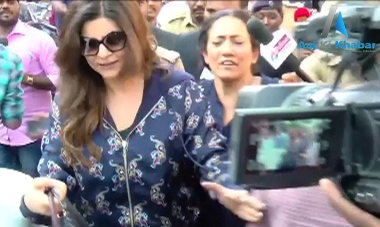Feature
High court appoints official to block ‘Blue Whale’

 MADURAI: The Madurai bench of the Madras high court on Tuesday directed the central and state governments to bring `over the top’ (OTT) service providers into the legal framework of India to check the `Blue Whale’ menace. Appropriate steps should be taken immediately to make all OTT services and service providers comply with Indian laws and to provide the required information to law enforcing agencies, it said and asked the Tamil Nadu government to appoint a nodal officer to ensure implementation of the order.
MADURAI: The Madurai bench of the Madras high court on Tuesday directed the central and state governments to bring `over the top’ (OTT) service providers into the legal framework of India to check the `Blue Whale’ menace. Appropriate steps should be taken immediately to make all OTT services and service providers comply with Indian laws and to provide the required information to law enforcing agencies, it said and asked the Tamil Nadu government to appoint a nodal officer to ensure implementation of the order.
Justices K K Sasidharan and G R Swaminathan took up the issue suo motu as a PIL and passed the orders on Tuesday . It said, “Protecting the society is the joint responsibility of the ser vice providers, content providers, lawmakers, society , family and the community at large and of course the users of internet themselves. Court cannot remain mute spectators when the society is faced with such a social menace. Hence, the case is disposed of with directions to the central and state governments.”
“Technology companies and websites follow the laws of their respective jurisdiction and as such, they do not provide data and information, in spite of making a request for it by the law enforcing agencies in India on account of violation of India laws,” the bench said. “The government must consider amending relevant rules and regulations applicable to Indian subsidiaries and websites making it compulsorily amenable to Indian laws.” The Centre should direct internet service providers to take due diligence to remove all the links and hashtags presently being circulated on social media platforms and also in dark net with URLslinks related to the Blue Whale game and to furnish information regarding downloadsaccess to suspicious links.
The state shall designate forthwith vigilance and anti-corruption joint director Dr S Murugan as the nodal officer in terms of Rule 4 of the Information Technology (Procedure and Safeguards for Blocking for Access of Information by Public) Rules, 2009, who must ensure implementation of the order blocking the website and removing links.The school and higher education secretaries shall take active steps to ensure educational institutions sensitise and “warn students as well as parents not only about this Blue Whale challenge game but also the lurking dangers” in the digital world, the bench said.
Entertainment
Meghalaya Reserves Legalized Gambling and Sports Betting for Tourists

The State Scores Extra High on Gaming-Friendly Industry Index
Meghalaya scored 92.85 out of 100 possible points in a Gaming Industry Index and proved to be India’s most gaming-friendly state following its recent profound legislation changes over the field allowing land-based and online gaming, including games of chance, under a licensing regime.
The index by the UK India Business Council (UKIBC) uses a scale of 0 to 100 to measure the level of legalisation on gambling and betting achieved by a state based on the scores over a set of seven different games – lottery, horse racing, betting on sports, poker, rummy, casino and fantasy sports
Starting from February last year, Meghalaya became the third state in India’s northeast to legalise gambling and betting after Sikkim and Nagaland. After consultations with the UKIBC, the state proceeded with the adoption of the Meghalaya Regulation of Gaming Act, 2021 and the nullification of the Meghalaya Prevention of Gambling Act, 1970. Subsequently in December, the Meghalaya Regulation of Gaming Rules, 2021 were notified and came into force.
All for the Tourists
The move to legalise and license various forms of offline and online betting and gambling in Meghalaya is aimed at boosting tourism and creating jobs, and altogether raising taxation revenues for the northeastern state. At the same time, the opportunities to bet and gamble legally will be reserved only for tourists and visitors.
“We came out with a Gaming Act and subsequently framed the Regulation of Gaming Rules, 2021. The government will accordingly issue licenses to operate games of skill and chance, both online and offline,” said James P. K. Sangma, Meghalaya State Law and Taxation Minister speaking in the capital city of Shillong. “But the legalized gambling and gaming will only be for tourists and not residents of Meghalaya,” he continued.
To be allowed to play, tourists and people visiting the state for work or business purposes will have to prove their non-resident status by presenting appropriate documents, in a process similar to a bank KYC (Know Your Customer) procedure.
Meghalaya Reaches Out to a Vast Market
With 140 millions of people in India estimated to bet regularly on sports, and a total of 370 million desi bettors around prominent sporting events, as per data from one of the latest reports by Esse N Videri, Meghalaya is set to reach out and take a piece of a vast market.
Estimates on the financial value of India’s sports betting market, combined across all types of offline channels and online sports and cricket predictions and betting platforms, speak about amounts between $130 and $150 billion (roughly between ₹9.7 and ₹11.5 lakh crore).
Andhra Pradesh, Telangana and Delhi are shown to deliver the highest number of bettors and Meghalaya can count on substantial tourists flow from their betting circles. The sports betting communities of Karnataka, Maharashtra, Uttar Pradesh and Haryana are also not to be underestimated.
Among the sports, cricket is most popular, registering 68 percent of the total bet count analyzed by Esse N Videri. Football takes second position with 11 percent of the bets, followed by betting on FIFA at 7 percent and on eCricket at 5 percent. The last position in the Top 5 of popular sports for betting in India is taken by tennis with 3 percent of the bet count.
Local Citizens will Still have Their Teer Betting
Meghalaya residents will still be permitted to participate in teer betting over arrow-shooting results. Teer is a traditional method of gambling, somewhat similar to a lottery draw, and held under the rules of the Meghalaya Regulation of the Game of Arrow Shooting and the Sale of Teer Tickets Act, 2018.
Teer includes bettors wagering on the number of arrows that reach the target which is placed about 50 meters away from a team of 20 archers positioned in a semicircle.
The archers shoot volleys of arrows at the target for ten minutes, and players place their bets choosing a number between 0 and 99 trying to guess the last two digits of the number of arrows that successfully pierce the target.
If, for example, the number of hits is 256, anyone who has bet on 56 wins an amount eight times bigger than their wager.























